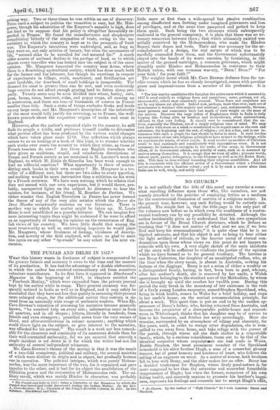THE PUNJAB AND DELHI IN 1857.*
WHAT this history wants in freshness. of sulsject is compensated by the greater fulness and accuracy it owes to the time and the manner of its production. It has had the advantage of a double elaboration, in which the author has received extraordinary aid from countless volunteer contributors. In its first form it appeared in Blackwood's Magazine in the beginning of 1858, in chapters entitled the ".Poorbeah Mutiny," which were expanded film the private journal kept by the author while in camp. Their general accuracy was fre- quently noticed in India as well as in Enedand and it may safely be concluded that they have not lost that quality in assuming theirpresent more enlarged shape, for the additional matter they contain is de- rived from an unusually wide range of authentic sources. When Mr. Cave-Browne's intention of recasting his narrative became generally known, "he received help on every side; information came in from all quarters, and in all shapes ; letters, literally in hundreds, from friends and even strangers ; pencilled notes from the very scenes of blood, and after-recollections in calmer moments ; anything which could throw light on the subject, or give interest to the narrative, was afforded for his perusal." The result is a work.not less remark- able for the closeness and continuity of its numerous details than for their well-warranted authencity, for we are assured that scarcely a single incident is set .down in it for which the writer had not the authority of several independent witnesses.
Mr. Cave-Browne's theory of the mutiny is that it was the result of a two-fold conspiracy, political and military, the several moieties of which were distinct in origin and in object, but gradually became one in operation. The political intrigue, which was purely Moham- Fiedan, was the more important of the two, for it organized and gave impulse to the other, and it had for its object the annihilation of the Christian power and the restoration of Mohammedan rule. The mi- litary revolt, which was mainly Hindoo in character, was probably
• The Punjab and Delhi in 1857 ; being a Narrative of the Measures by which the Punjab was Saved and Delhi Recovered during the Indian. Mutiny. By the Rev. J., Cave-Browne, M.A., Chaplain of the Punjab Movable Column in 1857. In two Volumes. Blackwood and Sons. little more at first than a wide-spread but pussive combination amon,5 disaffected men fretting under iinagined grievances and loss. of privileges, and at the same time pampered and petted to keep them quiet. Such being the two elements which subsequently coalesced in the general conspiracy, it is plain that there was no ne- cessary connexion between them; that which ultimately existed was artfully contrived by the Mohammedans, who made the Hindoo Sepoys their dupes and tools. Their aid was necessary for the ac- complishment of a design, the real nature of which was to be carefully concealed from them, and the Government unfortunately played into the hands of its worst enemies, by furnishing, in the matter of the greased cartridges, a common grievance, which might plausibly unite Hindoo and Mohammedan in resistance to their British rulers, with one common war-cry, "Deen ! Deen.1" "For your faith ! for your faith !"
The weighty moral which Mr. Cave Browne deduces from the ter- rible events which he has so closely investigated, comes with peculiar grace and impressiveness from a member of his profession. It is. this :
" The late mutiny establishes this fact,that the active form which it assumed in 1857 it owed entirely to religious fears and suspicions ; some, perhaps,. not all, unreasonably, others most causelessly aroused. Those fears and suspicions are not by any means yet allayed. Indeed now, perhaps, more than ever, each act of Government is watched with anxiety and mistrust; and, unfortunately, Govern- ment protests and assurances have lost much of their weight on the mass of the natives. Moreover the large influx of Englishmen fresh to India is daily keeping this feeling alive by heedless and inconsiderate, often unintentional, offences to that very feeling. It should ever be remembered that the na- tives, especially the Hindoos, are of a deeply religious turn of mind. We may look down with scorn on a mind so constituted as to regard caste as the sum and substance, the beginning and the end, of religion ; yet it is a fact, and in our in- tercourse with such a people the fact should be borne in mind. It need involve no compromise of our own religious principle to have respect to the feelings, while we reprobate the tenets, of other creeds. It need involve no sacrifice of Christian truth to deal cautiously and considerately with superstitious error. It is not- necessary, for instance, to recognize in the ranks of the army, in Government offices, or in Government schools, any priority of caste, such as is assumed by natives among themselves. It is enough that we treat all alike ; promote worth,. reward merit, punish delinquency, in the Chumar as well as in the Kulen Brah- min. This may be done without wounding their religious sensibilities. And all this is consistent with the efficient action of a Government which a Christian nation exercises over a heathen colony; and it is by such a course alone that India can be well, wisely, and safely ruled."






























 Previous page
Previous page